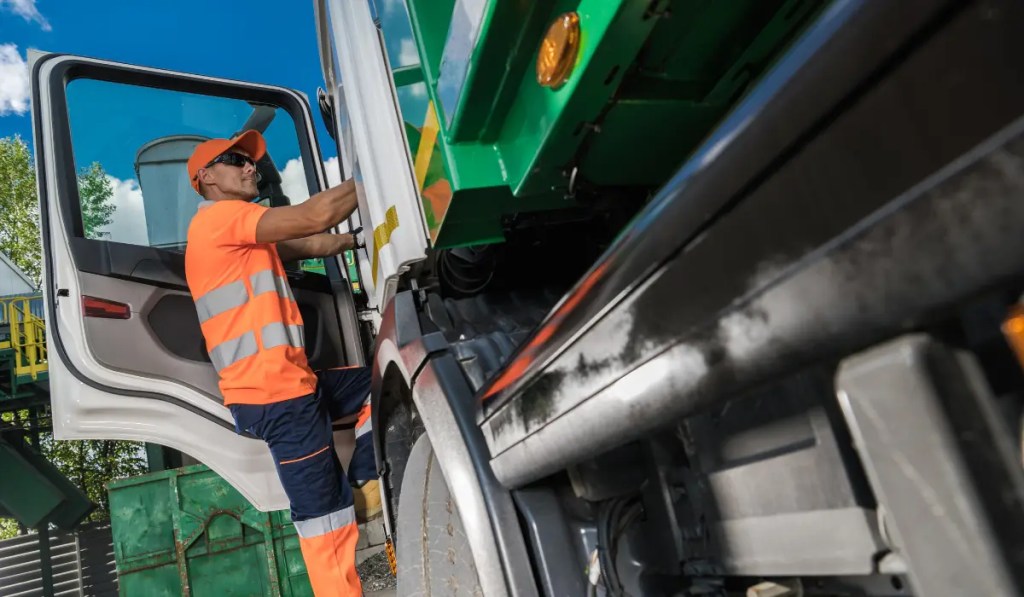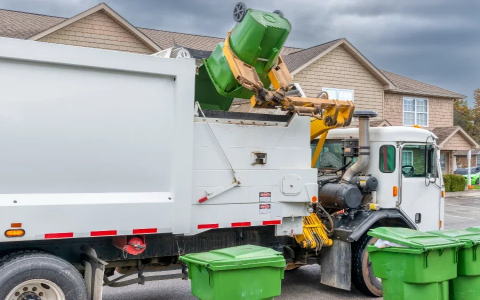How to Become a Garbage Truck Driver | Career Guide
How to Become a Garbage Truck Driver | Career Guide
So, you’re thinking about how to become a garbage truck driver? It’s a solid career path that’s often overlooked. This isn’t just about driving; it’s a vital role that keeps our communities clean, safe, and healthy. The job offers stability, decent pay, and benefits, often without requiring a four-year college degree. If you enjoy being on the move, operating machinery, and doing work that has a real, immediate impact, this could be the perfect fit for you. This guide will walk you through every step, from the basic requirements to landing your first job behind the wheel of a waste collection vehicle.
Why Consider a Career as a Garbage Truck Driver?
Before we dive into the “how,” let’s talk about the “why.” Driving a garbage truck is more than just a job; it’s a critical public service. Here are some compelling reasons to pursue this path:

- Job Security: People will always produce trash. This creates a constant, non-negotiable demand for waste collection services, making it a highly recession-resistant career.
- Competitive Pay and Benefits: According to the U.S. Bureau of Labor Statistics, the median annual wage for refuse and recyclable material collectors was $48,040 in May 2023. Many positions also come with full benefits packages, including health insurance and retirement plans.
- Structured Hours: Unlike long-haul trucking, garbage truck driving typically offers local routes, allowing you to be home every night.
- Physical Activity: The job keeps you physically active, combining driving with loading and unloading, which can be a great alternative to a sedentary office job.
Key Requirements and Qualifications
Becoming a garbage truck driver isn’t overly complex, but it does require meeting specific criteria. Here’s what you’ll typically need:
- Age and Education: You must be at least 18 years old (21 for some interstate positions) and possess a high school diploma or GED.
- Driver’s License: This is the most crucial part. You will need a Commercial Driver’s License (CDL). Most garbage truck operations require a Class B CDL, which allows you to operate a single vehicle with a gross vehicle weight rating (GVWR) of 26,001 pounds or more. Some vehicles with specialized mechanisms might require additional endorsements.
- Clean Driving Record: A history of safe driving is essential. Companies will scrutinize your motor vehicle record (MVR) for any major violations.
- Physical Fitness: You must be able to lift heavy bins, sometimes over 50 pounds, and be on your feet for most of the day.
- Background Check: Most employers will conduct a pre-employment drug screening and criminal background check.
The Step-by-Step Path to Getting Hired
Follow these concrete steps to launch your career in waste management.
Step 1: Research and Self-Assessment
Start by understanding the local job market. Look up municipal sanitation departments and private waste management companies in your area. Read job descriptions to get a feel for their specific requirements. Be honest with yourself about your physical capability and willingness to work in all weather conditions.
Step 2: Obtain Your Commercial Driver’s License (CDL)
This is the biggest hurdle and your primary goal. The process involves:
- Studying your state’s CDL manual.
- Obtaining a Commercial Learner’s Permit (CLP) by passing a written knowledge test.
- Practicing driving with your CLP (usually requiring a licensed CDL holder in the passenger seat).
- Passing the skills test, which includes a vehicle inspection, basic controls test, and a road driving exam.
Many choose to attend a certified CDL training school, which can cost a few thousand dollars but significantly speeds up the process and improves your skills. Some larger waste management companies, like Waste Management Inc., even offer paid training programs to help you get your CDL with a commitment to work for them afterward.
Step 3: Gain Experience and Apply for Jobs
Once you have your Class B CDL in hand, it’s time to apply. Don’t be discouraged if you lack experience; many municipal services and some private companies are willing to train new CDL holders. Highlight your license, clean driving record, and strong work ethic in your applications and interviews.
A Day in the Life of a Sanitation Engineer
What does a typical day look like? It usually starts very early, often before sunrise. You’ll perform a pre-trip inspection of your truck to ensure it’s safe for the road. Then, you’ll head out on your assigned route. The work is a mix of driving and physical labor. You’ll operate the truck’s hydraulic controls to lift and empty containers, and you’ll also hop out to manually collect trash that isn’t curbside. It’s a physically demanding but straightforward and satisfying routine. Teamwork is crucial, especially if you’re working with a helper or a crew.

Career Outlook and Advancement Opportunities
The future looks bright for those in this field. The U.S. Bureau of Labor Statistics projects about 5,900 openings for refuse and recyclable material collectors each year, on average, over the decade. Many of these openings are expected to result from the need to replace workers who transfer to different occupations or exit the labor force.
This isn’t a dead-end job. With experience, you can move into roles such as:
- Route Manager/Supervisor: Overseeing operations and managing a team of drivers.
- Heavy Equipment Operator: Operating more complex machinery at landfills or recycling centers.
- Dispatcher: Coordinating routes and communicating with drivers from the office.
- Safety Trainer: Training new hires on safe operating procedures.
Garbage Truck Driver vs. Other CDL Driving Jobs
How does this career stack up against other truck driving opportunities? Let’s break it down in a simple comparison.
| Job Type | Typical Schedule | Home Time | Physical Demand | Primary Focus |
|---|---|---|---|---|
| Garbage Truck Driver | Early morning, daytime | Home every day | High | Local service, repetitive routes |
| Long-Haul Trucker | Irregular, overnight | Weeks away | Low (sedentary) | Long-distance freight |
| Delivery Driver (e.g., UPS) | Daytime | Home every day | High | Package delivery, customer interaction |
| Bus Driver | Split shifts, weekends | Home every day | Low to Medium | Passenger safety and transport |
Essential Skills for Success on the Route
Beyond the license, what makes a great garbage truck operator? Industry veterans and hiring managers consistently point to a few key traits:
- Customer Service: You are the face of the company for many residents. A friendly nod or wave goes a long way.
- Time Management: Routes are timed, and efficiency is key to finishing your day on schedule.
- Spatial Awareness: Maneuvering a large vehicle in tight residential streets requires precision and constant attention.
- Reliability: Companies need drivers they can count on, day in and day out.
- Teamwork: Coordinating with your crew or helper is essential for safety and efficiency.
Frequently Asked Questions (FAQ)
Q: How much does it cost to get a CDL?
A: The cost can vary widely. Self-studying and testing through your state’s DMV might cost a few hundred dollars. A professional truck driving school can range from $3,000 to $7,000. The best option is to find a company with a paid training program.
Q: Is the job dangerous?

A: Like any job involving heavy equipment, there are risks. The most common hazards are strains from lifting, slips and falls, and accidents involving vehicles or machinery. This is why rigorous safety training and adherence to protocols are non-negotiable. According to a CDC/NIOSH report, solid waste collection is a high-risk occupation, underscoring the importance of safety awareness.
Q: Do I need prior experience to become a garbage truck driver?
A> Not necessarily. Many employers, especially municipal services, provide on-the-job training for candidates who already possess their CDL. Your demonstrated work ethic and safe driving record are often more important than specific waste collection experience.
Q: What’s the difference between a Class A and Class B CDL?
A: A Class A CDL allows you to drive combination vehicles, like a semi-truck with a trailer, and is generally for long-haul and heavy freight. A Class B CDL is for single, heavy vehicles (like a garbage truck, bus, or straight truck) and is the standard for this industry. Some specialized roles may require a Class A.
Final Thoughts
Pursuing a career as a garbage truck driver is a practical and rewarding choice. It provides a essential service, competitive compensation, and a clear path to a stable future. By obtaining your Commercial Driver’s License, showcasing a strong work ethic, and committing to safety, you can secure a position that offers more than just a paycheck—it offers the pride of a job well done, every single day. Start by researching local requirements and take that first step toward a dependable career on the road.
Sources and Further Reading
- U.S. Bureau of Labor Statistics, Occupational Outlook Handbook: Refuse and Recyclable Material Collectors.
- Federal Motor Carrier Safety Administration (FMCSA), Commercial Driver’s License Program.
- National Institute for Occupational Safety and Health (NIOSH), Safety and Health Topics.









